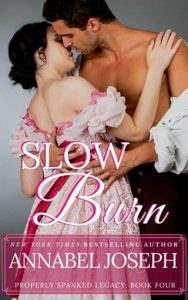Total pages in book: 91
Estimated words: 86167 (not accurate)
Estimated Reading Time in minutes: 431(@200wpm)___ 345(@250wpm)___ 287(@300wpm)
Estimated words: 86167 (not accurate)
Estimated Reading Time in minutes: 431(@200wpm)___ 345(@250wpm)___ 287(@300wpm)
Alas, such bliss is not guaranteed. August finds himself compelled to play the hero when her fourth engagement ends with spectacular cruelty before all their family and friends. Their hasty marriage of convenience solves problems for Elizabeth and August, yes, but creates problems too. For August knows he can never reveal the depth of his debauched hungers to someone so innocent and vulnerable, lest he hurt her even more than she’s already been hurt…
*************FULL BOOK START HERE*************
Chapter One
A Piano Lesson
Oxfordshire, 1826
Lady Elizabeth Morgaine Drake lowered her head, her gaze focused upon her gloves as the carriage pulled into the courtyard. Already, an excited flush heated her cheeks, despite the cold outside. Did her chaperone notice? She brought Larissa to her music lessons precisely because her middle-aged cousin tended to be an absent and unobservant supervisor. Elizabeth looked out the window at Lord Augustine’s stately country manor, then gathered her piano music from its place upon the cushion. She hadn’t touched it all week, by design.
The tall, heavy door opened as she approached, the somber-faced butler admitting her and Larissa with a deep bow. Elizabeth’s father was a duke; she’d grown up accustomed to such scraping and bowing, though it always seemed silly to her. Her father was the distinguished and powerful person. She was just his youngest daughter, flighty and strange, given to whimsy. Whimsy indeed, her conscience chided. These lessons have become too whimsical by half, and you to be married to the Marquess of Fortenbury at Christmas.
She shrugged off such thoughts. Why, a wife ought to improve herself, and Lord Augustine was one of the most talented musicians in London. Truly, his artistry knew no bounds. Her artistry, however…
The butler took their hats and warm, lined pelisses, and guided them through the manor’s grand foyer, past the polished, winding staircase, and into the formal parlor, where the customary setting of biscuits, cocoa, and tea were laid out for their enjoyment. “I shall inform my lord that you have arrived for your piano lesson,” said the butler, bowing again.
“We’re rather early,” said Elizabeth.
“No matter. If you wish, you may proceed to the music room to practice before the start of your lesson.”
“Thank you. That won’t be necessary.”
Larissa collected a plate of fresh biscuits as a maidservant poured tea. Elizabeth looked about the parlor, thinking what a lovely house Lord Augustine kept in the Oxfordshire countryside. St. Pierre was an old family mansion, half done up in a modern way and half left to history. Elizabeth felt ghosts here, but they were the benevolent kind, the sort that had settled in with contented resignation and had no impulse to haunt at all. The windows admitted the afternoon light, and a generous fire crackled beneath an ornate oak mantel, ensuring a perfect temperature.
“The cinnamon biscuits are my favorite,” said Larissa. “I believe they’ve just come out of the oven.”
“Lord Augustine knows how much you like them. He instructs the cook to make them for us on piano lesson days.”
Well, for Larissa. Elizabeth felt too nervous to eat, or perhaps she was too enthralled by August’s great, fine country house. Many things enthralled Elizabeth. Everything had an energy. She listened and learned from that energy and perceived more sometimes than she wished to. It took some time before she realized herself isolated in this ability. Others could not intuit the things she did.
Of Larissa, she perceived a harmless personality: goodness and a deep love for biscuits, sweetness, and comfort. Of Lord Augustine’s butler, a fervor for duty somewhat tempered by an impatience for womenfolk. Of her husband-to-be, Lord Fortenbury, she sensed deep rectitude and faith which made him seem solid. Her father called Lord Fortenbury an “upstanding gentleman,” a summation with which she agreed. He was a wealthy, lofty peer, quite handsome, and a good marriage prospect. He was certainly the best prospect she could manage at this point, with her history of broken engagements.
She’d hardly come to know the first marriage candidate, Lord Cole. He’d died in a tragic digestive accident, choking upon a fish bone shortly after their betrothal was announced. She’d very much liked her second fiancé, Lord Sylvanbrook, until he’d succumbed to a brain apoplexy in ungenteel surroundings mere days before their nuptials. She’d been very, very wrong about his suitability for marriage. Her third prospect—her third!—had died in a fall from his horse two weeks after he’d proposed to her in her father’s study. A fall, her parents said, but she learned later he’d sailed over his horse’s head and into a tree because he’d been racing with a friend.
People had wondered at that, why she had not foreseen this outcome and tried to prevent it, as if she had such specific powers of precognition. As if she might foresee that a horse would stumble! Perfect strangers ascribed all sorts of mysterious powers to her, which was utter nonsense. If she’d known Lord Greyfield might die, of course she would have tried to prevent it. Greyfield had been handsome and virile, if somewhat avaricious of her dowry. One hadn’t needed special powers to understand that. She sensed less avaricious leanings in Lord Fortenbury, which improved his stature as a fiancé.
As for Lord Augustine, she had known him so long and so well that her perception of him contained too many feelings and energies to dissect. Which was nice, in a way. Sometimes she didn’t wish for nagging observations about this or that companion. She only wished to exist with that person. Her closest friends were not readable, merely comfortable.
